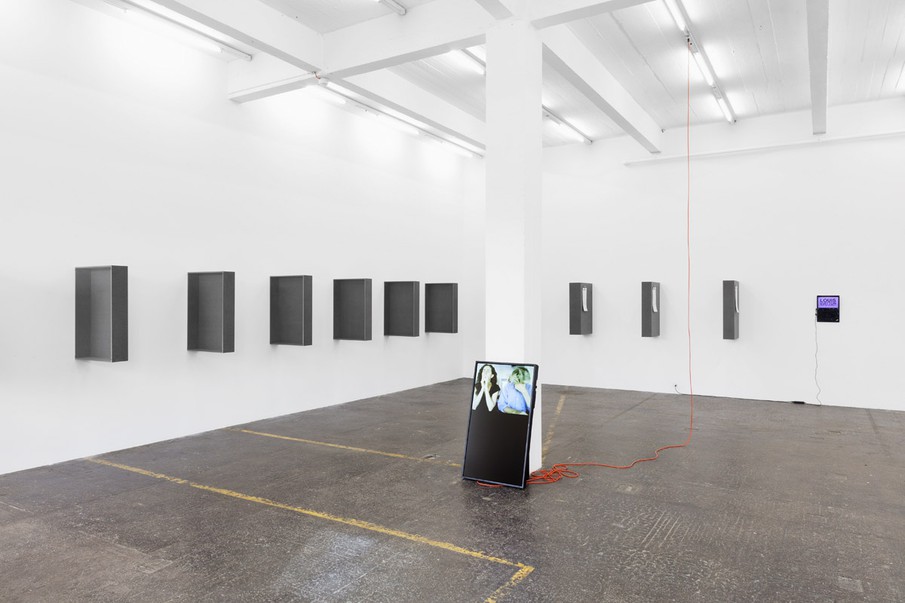
Book out now.

«Can a robot, or a piece of software, be jailed if it commits a crime?
Where does legal culpability lie if code is criminal by design or
default? What if a robot buys drugs, weapons, or hacking equipment and
has them sent to you, and police intercept the package?» These are some
of the questions Mike Power asked when he reviewed the work «Random
Darknet Shopper» in The Guardian. The work was part of the exhibition
«The Darknet – From Memes to Onionland. An Exploration» in the Kunst
Halle St. Gallen, which closed on Sunday, January 11, 2015. For the duration of
the exhibition, !Mediengruppe Bitnik sent a software bot on a
shopping spree in the Deepweb. Random Darknet Shopper had a budget of
$100 in Bitcoins weekly, which it spent on a randomly chosen item from
the deepweb shop Agora. The work and the exhibition received wide
attention from the public and the press. The exhibition was
well-attended and was discussed in a wide range of local and
international press from Saiten to Vice, Arte, Libération, CNN, Forbes. «There’s
just one problem», The Washington Post wrote in January about the work,
«recently, it bought 10 ecstasy pills».
What does it mean for a society, when there are robots which act
autonomously? Who is liable, when a robot breaks the law on its own
initiative? These were some of the main questions the work Random
Darknet Shopper posed. Global questions, which will now be negotiated
locally.
On the morning of January 12, the day after the three-month
exhibition was closed, the public prosecutor's office of St. Gallen
seized and sealed our work. It seems, the purpose of the
confiscation is to impede an endangerment of third parties through
the drugs exhibited by destroying them. This is what we know at present. We believe that
the confiscation is an unjustified intervention into freedom of art.
We'd also like to thank Kunst Halle St. Gallen for their ongoing support
and the wonderful collaboration. Furthermore, we are convinced, that it
is an objective of art to shed light on the fringes of society and to
pose fundamental contemporary questions.
!Mediengruppe Bitnik, January 15 2015
«Können ein Roboter oder eine Software ins Gefängnis gesteckt werden,
wenn sie ein Verbrechen begehen? Wer haftet, wenn ein Code dazu
programmiert wurde, Verbrechen in Kauf zu nehmen? Was, wenn der Roboter
Drogen, Waffen oder Hacker-Ausrüstung kauft, sie an einen Empfänger
liefern lässt und die Polizei das Paket abfängt?» Diese Fragen stellte
Mike Power in der britischen Tageszeitung The Guardian im Dezember
anlässlich seiner Besprechung der Darknet-Ausstellung in der Kunst Halle
St. Gallen, die am Sonntag 11. Januar 2015 zu Ende ging. Die !Mediengruppe Bitnik hatte
während drei Monaten einen Bot im Darknet auf Reisen geschickt, der
mit 100 Dollar wöchentlich in diesem Schattenreich des Internets per
Zufallsgenerator auf Shoppingtour ging. Die Ausstellung stiess auf reges
Interesse bei der Bevölkerung und der Presse. Die Führungen waren immer
ausgebucht, neben dem St. Galler Tagblatt und Saiten berichteten
Kunstmagazine sowie Vice, Arte, Libération, CNN, Forbes. «In der Tat gibt es nur ein
Problem», schrieb die Washington Post Anfang Januar über die Aktion in
St. Gallen: «Kürzlich kaufte der Roboter zehn Ecstasy-Pillen.»
Was bedeutet es für die Gesellschaft, wenn Roboter plötzlich autonom
handeln? Wer ist haftbar, wenn ein Roboter von sich aus gegen das Gesetz
verstösst? Dies waren zentrale Fragen der Arbeit «Random Darknet
Shopper». Globale Fragen, die nun lokal verhandelt werden.
Am Morgen des 12. Januar, am Tag nach Beendigung der dreimonatigen Ausstellung,
beschlagnahmte und versiegelte die Staatsanwaltschaft des Kantons St.
Gallen in der Kunst Halle unsere Arbeit. Mit der Beschlagnahme und der
Vernichtung der Ecstasy-Pillen soll offenbar eine
Drittgefährdung ausgeschlossen werden. Dies ist unser aktueller Kenntnisstand, weswegen wir
uns im Moment nicht weiter zur Sache äussern können. Wir sind jedoch der
Meinung, dass die Beschlagnahme der Kunstobjekte ein ungerechtfertigter
Eingriff in die Kunstfreiheit darstellt. An dieser Stelle möchten wir
uns bei der Kunst Halle St. Gallen für die Zusammenarbeit und die
Unterstützung bedanken. Wir sind überzeugt, dass es eine Aufgabe der
Kunst ist, Ränder auszuleuchten und zeitgenössische, gesellschaftliche
Fragen zu thematisieren.
!Mediengruppe Bitnik, 15. Januar 2015